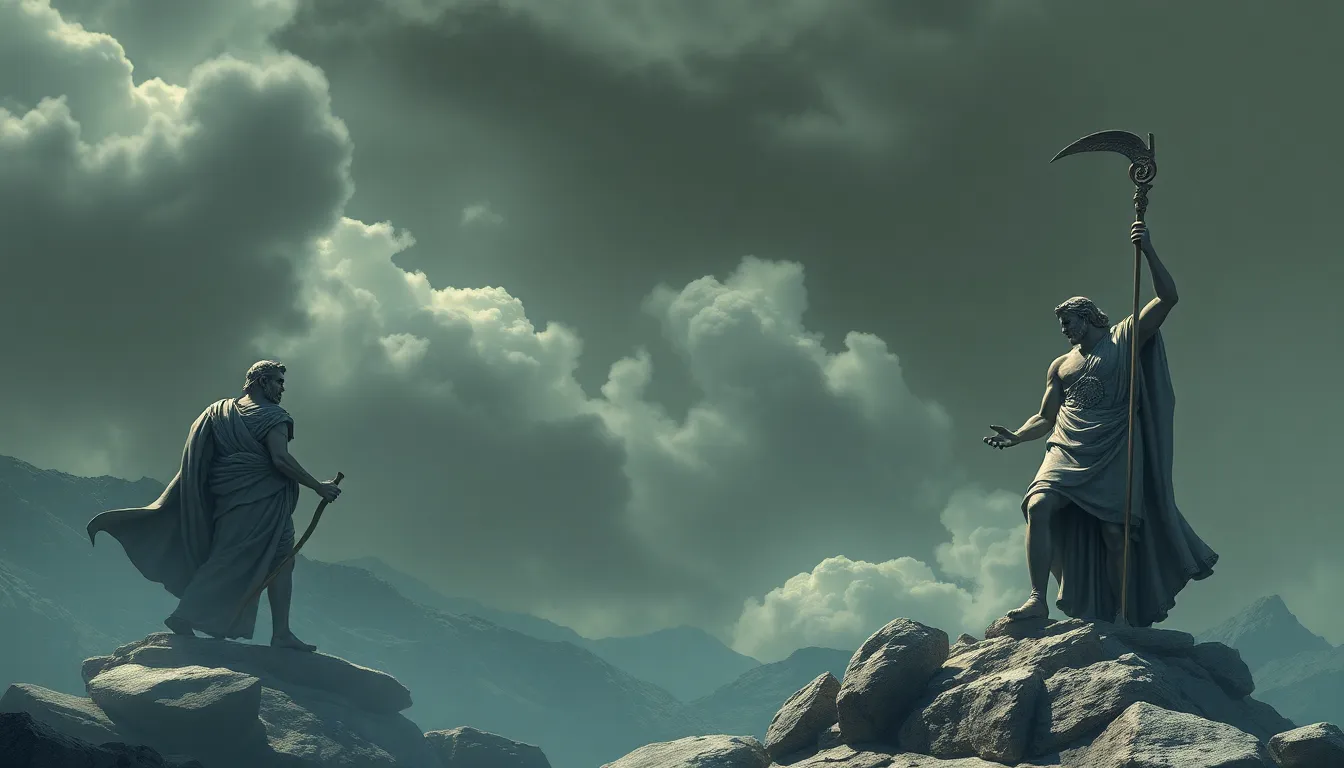The Role of Fate in the Lives of Heroes in Greek Mythology
I. Introduction
In Greek mythology, fate is a powerful force that governs the lives of both mortals and gods. It is often depicted as an inescapable destiny that dictates the course of one’s life. The concept of fate is crucial to understanding the narratives of Greek heroes, who frequently grapple with their predetermined paths.
This article explores the significance of fate in the stories of Greek heroes, examining how it influences their decisions and actions, and the philosophical ramifications of this interplay. By delving into the myths and the roles of fate, we can gain a deeper understanding of heroism in Greek culture.
II. Understanding Fate in Greek Culture
The Greek concept of fate is closely tied to the idea of Moira, which refers to a person’s allotted share of life and destiny. The Moirai, or Fates, were three sister deities who controlled the threads of life, determining the fate of every individual.
- Clotho – spins the thread of life.
- Lachesis – measures the thread.
- Atropos – cuts the thread, signifying death.
This triad of deities symbolizes the inevitability of fate and the limited control individuals have over their destinies. The relationship between fate and free will is complex in Greek culture, as heroes often face the tension between following their own desires and adhering to the paths laid out for them by the Fates.
Greek beliefs surrounding destiny also emphasize the influence of the divine on human affairs. The gods frequently intervene in mortal lives, further complicating the notion of free will and fate.
III. Key Heroes and Their Fateful Journeys
Several prominent heroes in Greek mythology exemplify the profound impact of fate on their lives. Notable figures such as Achilles, Odysseus, and Hercules each navigate their destinies in unique ways, reflecting the tension between personal choice and predetermined outcomes.
- Achilles – Fated to die young but achieve eternal glory.
- Odysseus – Struggles against fate to return home, facing numerous trials.
- Hercules – His labors are both a consequence of fate and a means of redemption.
In these narratives, heroes often confront their destinies head-on, showcasing their agency while simultaneously being bound by fate’s dictates. The interplay between choice and destiny creates rich and complex stories that resonate throughout Greek mythology.
IV. The Role of Prophecies and Omens
Prophecies and omens play a crucial role in the hero narratives of Greek mythology. These elements serve as warnings or guidance, often foreshadowing events that will shape the heroes’ journeys.
For instance, the prophecy given to Oedipus foretold that he would kill his father and marry his mother, a fate that he ultimately cannot escape despite his efforts to avoid it. This tragic tale illustrates how knowledge of one’s fate can lead to attempts to alter it, often resulting in unintended consequences.
In many cases, omens—such as dreams, signs, or animals—also influence the decisions of heroes, adding layers of complexity to their stories. The heroes’ interpretations of these omens often reflect their inner struggles with fate and free will.
V. Fate vs. Free Will: A Philosophical Perspective
The philosophical debate between fate and free will has been a significant topic of discussion since ancient times. Greek philosophers such as Plato and Aristotle explored these concepts, contemplating the extent to which individuals have control over their lives.
In the context of Greek mythology, this debate is particularly relevant to heroes who face moral dilemmas. The question arises: are their choices truly their own, or are they merely following a path predetermined by fate? This exploration leads to deeper reflections on morality, responsibility, and the human condition.
VI. The Consequences of Defying Fate
Many heroes attempt to alter their fates, often leading to dire consequences. These stories serve as cautionary tales about the dangers of hubris and the futility of trying to escape destiny.
- Icarus – His attempt to soar too close to the sun results in his fall.
- King Midas – His wish for the golden touch turns disastrous, illustrating the folly of greed.
- Arachne – Her challenge to Athena leads to her transformation into a spider.
These narratives convey important lessons about accepting one’s fate and the potential repercussions of defying the natural order. The tragic outcomes highlight the significance of humility and the acceptance of one’s limitations.
VII. Fate’s Legacy in Heroic Myths
The enduring significance of fate in Greek mythology continues to influence literature and storytelling across cultures. The themes of destiny, choice, and the human struggle against the inevitable resonate in countless narratives throughout history.
Contemporary interpretations of fate in literature and film often draw from these ancient stories, reflecting the timeless nature of the battle between fate and free will. Modern heroes still grapple with the implications of their choices, echoing the experiences of their mythological predecessors.
VIII. Conclusion
In summary, fate plays a crucial role in shaping the lives and destinies of heroes in Greek mythology. The interplay between fate and free will creates profound narratives that explore the complexities of human existence.
The lasting impact of these themes on our understanding of heroism reveals the powerful influence of fate on both ancient and modern storytelling. Ultimately, the exploration of fate in mythology invites us to reflect on our own lives and the broader human experience, highlighting the intricate dance between destiny and choice.




